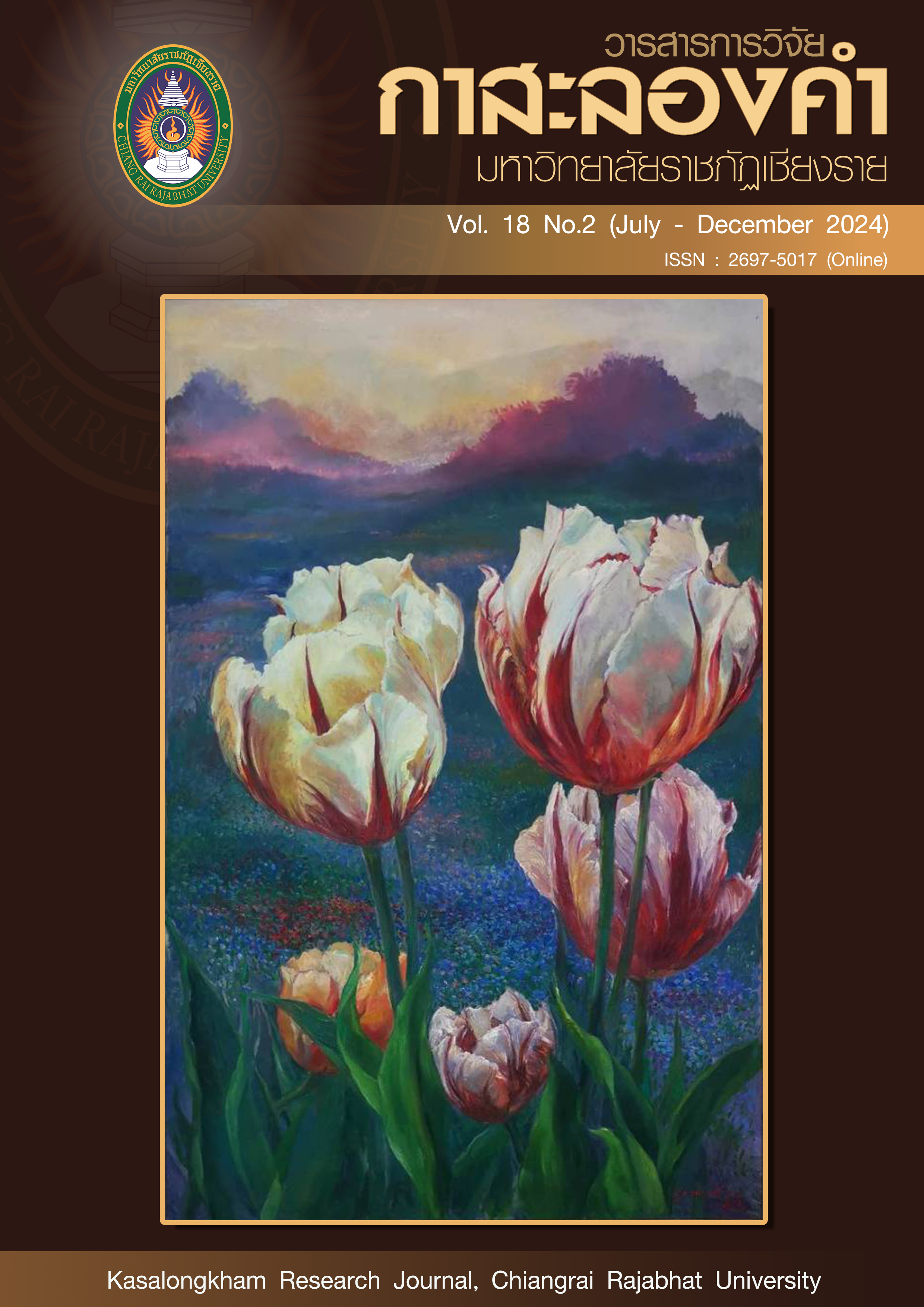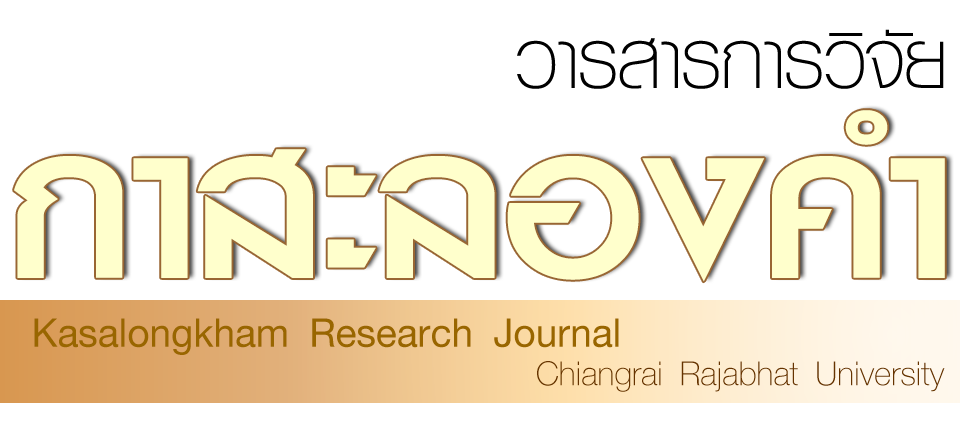การศึกษาแนวทางการใช้แชทบอทเพื่อช่วยลดความเครียดในกลุ่มนักศึกษา
คำสำคัญ:
ความเครียด, แชทบอท, นักศึกษา, ปัญญาประดิษฐ์บทคัดย่อ
บทความนี้มีวัตถุประสงค์เพื่อทบทวนวรรณกรรมที่เกี่ยวข้องกับการใช้ แชทบอทเพื่อลดความเครียดในนักศึกษามหาวิทยาลัย ใช้วิธีการทบทวนวรรณกรรม (Literature Review) โดยการศึกษาและสังเคราะห์องค์ความรู้จากแนวคิด ทฤษฎี และวรรณกรรมที่เกี่ยวข้องกับการใช้แชทบอทเพื่อลดความเครียดในนักศึกษามหาวิทยาลัย ผลการศึกษาพบว่า นักศึกษามักเผชิญกับความเครียดจากการเรียน การปรับตัว และความคาดหวังสูง ซึ่งส่งผลเสียต่อสุขภาพจิตและการเรียน แชทบอท ซึ่งเป็นเทคโนโลยีที่ขับเคลื่อนด้วยปัญญาประดิษฐ์ (AI) สามารถโต้ตอบกับนักศึกษาด้วยภาษาที่เป็นธรรมชาติ และให้การสนับสนุนทางอารมณ์ ข้อมูลที่เป็นประโยชน์ และกลยุทธ์การจัดการความเครียดได้ทันที จากสังเคราะห์องค์ความรู้จากการทบทวนวรรณกรรมแสดงให้เห็นว่าแชทบอทสามารถช่วยลดความเครียดและส่งเสริมสุขภาพจิตในกลุ่มวัยรุ่นได้อย่างมีประสิทธิภาพ บทความนี้เสนอว่ามหาวิทยาลัยควรพัฒนาและนำแชทบอทมาใช้เป็นเครื่องมือในการช่วยเหลือนักศึกษาในการจัดการความเครียด โดยร่วมมือกับคณาจารย์ นักศึกษา และนักจิตวิทยา เพื่อให้แน่ใจว่า แชทบอทตอบสนองความต้องการเฉพาะของนักศึกษาได้อย่างมีประสิทธิภาพ
เอกสารอ้างอิง
Baron, N. S., and Sebo, B. (2018). Emotional support chatbots for depression: A randomized controlled trial. Journal of Medical Internet Research, 20(3), e17.
Burke, M. A., Jackson, J. J., Hussey, J. M., & Woody, S. R. (2018). Using a personalized mobile app to manage workplace stress: A randomized controlled trial. Journal of Occupational Health Psychology, 23(1), 104-115.
Chunamphai, P., Chunamphai, N., and Koetphakdee, N. (2021). Development and effectiveness of a chatbot for promoting mental health among students during the COVID-19 pandemic. Thai Journal of Psychology, 43(3), 321-332.
Department of Mental Health, Ministry of Public Health. (2021, August 16). Guideline Mental care for field hospitals. https://mhso.dmh.go.th/page/subject_details.php?subject_id=427
Department of Mental Health. (2017, October 9). Stress and Suicide Report. http://www.dmh.go.th/report/suicide/age.asp, 2017
Electronic Transactions Development Agency (ETDA). (2020). Thailand Internet User Behavior 2020. https://www.etda.or.th/th/A2-Thailand-Internet-User-Behavior-th.aspx
Fitzpatrick, K. K., Darcy, A., & Vierhile, M. (2017). Delivering cognitive behavior therapy to young adults with symptoms of depression and anxiety using a fully automated conversational agent (Woebot): A randomized controlled trial. JMIR Mental Health, 4(2), 119-146.
ICONEXT. (2022, July 4). Brain-computer interface: Technology that lets you communicate with your thoughts. ICONEXT. https://iconext.co.th/th/2022/07/04/brain-computer-interface
Jogaratnam, G. and Buchanan P. (2004). Balancing the Demands of School and Work: Stress and Employed Hospitality Students. International Journal of Contemporary Hospitality Management, 16(4), 237-245.
Khrobsorn, C., & Chaimongkol, N. (2013). Stress and Coping Behaviors among Adolescents in the Observation and Protection Center. Graduate School Burapha University. (in Thai)
Khunsantiphong, N., Chantasean, S., Chuangtaisong, A., Chatchawal, N., Meethongsan, C., & Muipong, S. (2019). Factors Associated with Stress among Thai Traditional Medicine Students in Eastern Thailand. Thai Journal of Public Health and Health Sciences, 3(3), 52-63.
Klinmalee, R. (2022). A phenomenographic study of teaching and learning ability through cartoon movies animation. Journal of Positive School Psychology, 6(5), 3907-3916. https://journalppw.com/index.php/jpsp/article/view/6868/4477
Latane, B., & Darley, J. M. (1968). The short-term bystander effect: When bystanders do nothing. The Journal of Personality and Social Psychology, 11(3), 193-200.
Mahakittikun, K., Suwanchinda, P., and Chanchong, W. (2016). Adolescent Students’ Happiness. Songklanagarind Journal of Nursing, 36(1), 87-98.
Meemungbun, V.(2019). A Study of Undergraduate Students’ Stress in 2nd Semester 2018, Rajamangala University of Technology Thanyaburi. Student Development Division Rajamangala University of Technology Thanyaburi. (in Thai)
Mensah, C., Azila-Gbettor, E. M., Appietu, M. E., and Agbodza, J. S. (2020). Internship Work Related Stress: A Comparative Study between Hospitality and Marketing Students. Journal of Hospitality and Tourism Education. 33(1), 29-42.
Moawad, R. A. (2020). Online learning during the COVID-1 9 pandemic and academic stress inuniversity students. Revista Romaneasca Pentru Educatie Multidimensionala, 12(1), 100-107.
Naksiang, P., Poompaisal, N., & Khammanee, T. (2020). Social media use and mental health among Thai adolescents: A cross-sectional study. Journal of Adolescent Health, 57(3), 311-328.
Pakasit, T. (2013). Factors affecting learning anxiety of students in academic fields, Tourism and hotel business majors: A case study of students at Suan Dusit Rajabhat University. In Athit Ourairat (Chair), Rangsit University Academic Conference 2013 (RSU Research Conference 2013) (pp. 434-442). Pathum Thani: Rangsit University.
Petty, R. E., & Cialdini, R. B. (2009). Attitude change: A social psychological perspective. Routledge.
Phonjirasin, S & Niramon, S. (2011, 3 April). Stress and ways to relieve stress. Faculty of Pharmacy Mahidol University. https://pharmacy.mahidol.ac.th/th/knowledge/article/47/ความเครียด-วิธีแก้ความเครียด/
Rujirungsijareon, N., Chaisri, W., Chaiyasit, W., & Srisuwan, S. (2021). Factors Associated with Stress Levels in Secondary School Students under Bangkok Metropolitan Administration. Journal of the Psychiatric Association of Thailand, 66(1), 53-68.
Sari, L., Emily, A., Jeffrey, T., and Michele L. (2015). Gender Minority Social Stress in Adolescence: Disparities in Adolescent Bullying and Substance Use by Gender Identity. The Journal of Sex Research, 52(3), 243-256.
Seenophia, S., & Duangsong, R. (2021). Factors associated with stress and depression among first-year undergraduate students at Khon Kaen University. KKU. Journal for Public Health Research, 14(3), 10-23.
Singhadetweerachai, N. (2019). Stress study and stress management through recreational activities. Member of the Ban Nong Krathum Elderly Club Kamphaeng Saen District Nakhon Pathom Province [Master's Thesis]. Silpakorn University.
Tangkriangkit, P. (2020). Application of artificial intelligence system to automatically answer chats for learning. Royal Thai Air Force Medical Gazette, 66(2), 64-73.
Thaweephon, R., & Pasunon, P. (2015). Factors affecting student anxiety in the Hotel Management Branch at the Faculty of Management Science, Silpakorn University. Journal of Science and Technology, 23(5), 721-730.
Vaidyam, A. N., Wisniewski, H., Halamka, J. D., Kashavan, M. S., & Torous, J. (2020). Chatbots and conversational agents in mental health: A review of the psychiatric landscape. Canadian Journal of Psychiatry, 65(6), 376-384.
Wiangchai, P. (2015, May 14). Physiological response to stress. Institute for the Promotion of Teaching Science and Technology. http://biology.ipst.ac.th/?p=2767.

ดาวน์โหลด
เผยแพร่แล้ว
รูปแบบการอ้างอิง
ฉบับ
ประเภทบทความ
สัญญาอนุญาต
ลิขสิทธิ์ (c) 2024 วารสารการวิจัยกาสะลองคำ มหาวิทยาลัยราชภัฏเชียงราย

อนุญาตภายใต้เงื่อนไข Creative Commons Attribution-NonCommercial-NoDerivatives 4.0 International License.





